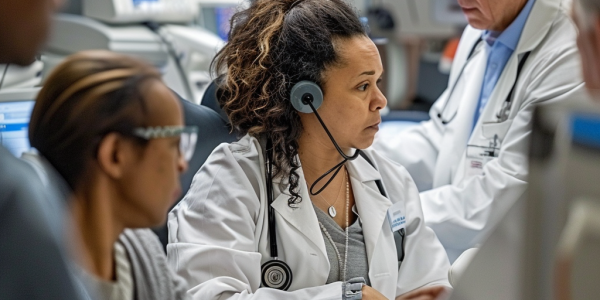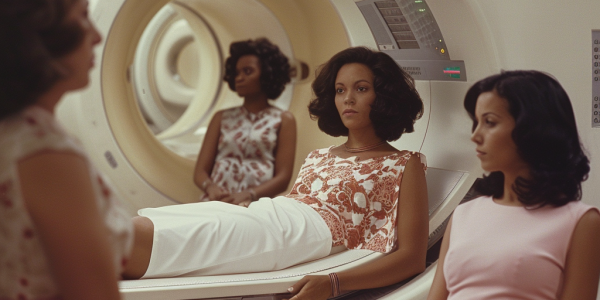SARAH Trial Reveals Heart Failure Drug’s Promise in Reducing Cancer Treatment Risks
A recent study presented at the 2024 AHA Scientific Sessions revealed that sacubitril/valsartan can significantly reduce the risk of cardiomyopathy in cancer patients undergoing anthracycline chemotherapy, with a remarkable 77% reduction noted in the SARAH trial. This research highlights the importance of protecting heart health in high-risk cancer patients, paving the way for safer treatment protocols and improved patient outcomes.
New Cardiovascular Risk Calculator Sparks Concerns Over Treatment Eligibility
A new cardiovascular risk calculator from Harvard Medical School promises improved accuracy in predicting heart attacks and strokes. However, recent research warns that nearly 16 million individuals may become ineligible for essential treatments, potentially leading to an increase of 107,000 heart attacks and strokes over the next decade. This study emphasizes the urgent need for reevaluation of treatment guidelines to ensure effective patient care.
Routine ECGs in Japan Show Promise in Identifying Cardiovascular Risks
Routine electrocardiograms (ECGs) in Japan have shown promising results in flagging risks of cardiovascular events among the general population. A recent study conducted on over 3.5 million healthy working adults in Japan revealed that individuals with ECG abnormalities during routine screenings in 2016 had notably higher rates of combined death and cardiovascular disease (CVD) admissions over a median follow-up period of 5.5 years. Despite these promising findings, experts suggest that this study alone may not be adequate to alter the current recommendations by the U.S. Preventive Services Task Force (USPSTF) and the European Society of Cardiology regarding routine ECG screenings for individuals at low risk of CVD.
Revolutionary Heart Failure Sensor Implanted in First Irish Patient
University Hospital Galway (UHG) has successfully conducted a groundbreaking medical procedure on Sheila Concannon, the first patient in Ireland to receive an innovative heart failure sensor. This cutting-edge device aims to revolutionize the monitoring and treatment of heart failure patients, offering new hope for improved outcomes and quality of life. Prof Faisal Sharif led the clinical trial, showcasing the potential of this technology to reduce hospitalizations and enhance patient care in Ireland.
Routine Stress Testing Post-High-Risk PCI Does Not Improve Outcomes for ACS Patients: Study
A recent study published in the Journal of American Medical Association reveals that routine stress testing 12 months post high-risk PCI does not offer additional benefits for ACS patients. The POST-PCI trial, conducted in South Korea, showed no improved clinical outcomes with routine testing. Effective follow-up is emphasized for this patient group, with an elevated risk of adverse events.
New Blood Test Revolutionizes Detection of Fatal Heart Condition in Children
Recent advancements in technology have led to a groundbreaking development in preventing sudden cardiac deaths in children. A new blood test can now identify Hypertrophic Cardiomyopathy and assess the risk of fatality, offering a more accessible and potentially life-saving diagnostic tool. This innovation marks a significant step forward in pediatric healthcare, allowing healthcare professionals to proactively manage cardiac conditions in children and safeguard their well-being.
Genetic Traits Linked to Increased Heart Attack Risk During Stressful Times
Recent research has uncovered genetic traits that may increase the risk of heart attacks during stressful times like holidays, elections, and major sporting events. Individuals genetically predisposed to stress have a significantly higher risk of suffering a heart attack after experiencing stressful events, shedding light on the link between stress and cardiovascular health. This study, analyzing data from nearly 18,500 individuals, identified a subgroup with a heightened susceptibility to stress, providing insight into the underlying mechanisms.
MRI Scans Offer More Accurate Detection of Heart Disease in Women
Learn how MRI scans may offer more accurate and early detection of heart disease in women compared to other diagnostic tools. A recent study found that MRI scans produced more precise images than invasive assessments, potentially revolutionizing the early detection of heart failure in women.
Yoga Enhances Heart Health in Heart Failure Patients
Recent research presented at the Heart Failure 2024 scientific congress of the European Society of Cardiology reveals that incorporating yoga practices, such as breathing techniques and meditation, alongside traditional medications can significantly enhance heart health and functional capacity in patients with heart failure. The study, conducted by Dr. Ajit Singh from the Indian Council of Medical Research, demonstrates the long-term benefits of yoga in improving symptoms, well-being, and heart function for individuals living with heart failure.
COVID-19 Vaccine Shows Promise in Extending Life Expectancy for Heart Failure Patients
Discover how the COVID-19 vaccine may enhance the survival prospects of heart failure patients, reducing the risk of death by 82%. Recent research presented at the Heart Failure 2024 congress in Lisbon highlights the significant benefits of vaccination, including lower rates of hospitalization and COVID-19 infection. With meticulous methodology and a large patient population, this study signals a potential paradigm shift in heart failure treatment.










